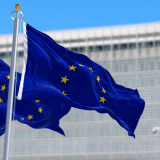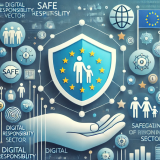
Shaping Europe’s Digital Future: Commission proposes a European Digital Identity
Setting the scene – what is the eIDAS Regulation?
The current EU rules on electronic identification and trust services for electronic transactions in the internal market (stipulated in the so-called eIDAS Regulation, Regulation 910/2014) aim to improve trust in the EU-wide electronic transactions and to increase the effectiveness of public and private online services and e-commerce. Following an impact assessment of these rules in 2020, the European Commission concluded that the potential of electronic identification and authentication under the eIDAS Regulation remains underexploited. This is why it announced that it would work on the further promotion of the Regulation, its effectiveness and extension of its application to the private sector.
On 3 June 2021, a new legislative framework was officially proposed, building on the eIDAS Regulation.
Applications in the gambling sector
Identification and authentication of players are extremely useful tools that can be used in the gambling sector to achieve the primary objectives of ensuring consumer protection and preserving public order. For example, by checking the identity of the player, their age or whether they have self-excluded.
Applications for anti-money laundering (AML) related purposes are also very relevant with eIDAS-compliant electronic identifications explicitly recognised by the EU’s 5th Anti Money Laundering Directive as a capable tool for providing a legal proof of identity of the eID holder, equivalent to in-person verification. They can also help to ensure secure communication between payment providers which is very important given the fact that payment transactions are increasingly being made online.
In an indirect way, identification and authentication can also help lotteries and other legal gambling operators in their fight against illegal online gambling offerings. Namely, lotteries and gambling sector in general face unregulated and illegal operators which tend to be licensed in a single EU Member State (or outside the EU) while offering their products online to players located in multiple EU Member States. This practice is to be considered illegal, as there is no mutual recognition of licenses in the gambling sector within the EU. No EU Member State is obliged to recognise in its national market the controls and rules set in place by another EU Member State. This unfair competition of illegal gambling services providers is a serious threat to the safety of EU players, but also to Member States themselves, as such providers tend not to comply with the requirements set up by the national legislation applicable in the Member States of the player with regard to anti-money laundering or taxation. Efficient identification and authentication systems in place could make player experience more pleasant through a smoother registration process and keep them away from the illegal gambling offering.
What’s new in the Commission’s legislative proposal?
The main novel element offered by the new rules is that everyone will have the right to have a European Digital Identity which will have to be accepted by all Member States. However, there will be no obligation to have one.
Member States will be issuing these European Digital Identities for their citizens and residents that should be able to link their national digital identities with proof of other personal attributes (e.g. driving licence, diplomas, bank account), provided by either public authorities or by private entities, under condition that they are recognised by a Member State. Furthermore, they should enable all Europeans to access services online without having to use private identification methods or unnecessarily sharing personal data. In other words, citizens should at all times retain full control of the data they share.
A few examples of how the European Digital Identity could be used – once in place – include proving one’s age and identity when attempting to use an (online) service or accessing a bank account. Important to note is that while service providers will be required to accept the use of European Digital Identity upon request of the user, the use of the European Digital Identity will always be at the choice of the user.
The proposal is accompanied by a Recommendation. The Commission invites Member States to establish a common toolbox by September 2022 and to start the necessary preparatory work immediately. This toolbox should include the technical architecture, standards and guidelines for best practices. The reason behind it is Commission’s desire to make the European Digital Identity a reality very soon.
”The European digital identity will enable us to do in any Member State as we do at home without any extra cost and fewer hurdles. Be that renting a flat or opening a bank account outside of our home country. And do this in a way that is secure and transparent. So that we will decide how much information we wish to share about ourselves, with whom and for what purpose. This is a unique opportunity to take us all further into experiencing what it means to live in Europe, and to be European.”
European Commission Executive Vice-President Margrethe Vestager
”EU citizens not only expect a high level of security but also convenience whether they are dealing with national administrations such as to submit a tax return or to enrol at a European university where they need official identification. The European Digital Identity wallets offer a new possibility for them to store and use data for all sorts of services, from checking in at the airport to renting a car. It is about giving a choice to consumers, a European choice. Our European companies, large and small, will also benefit from this digital identity, they will be able to offer a wide range of new services since the proposal offers a solution for secure and trusted identification services.”
European Commissioner for Internal Market, Thierry Breton
National lotteries deserve to be safeguarded and supported at national and EU level
The gambling sector within the EU is regulated in strict observance of the subsidiarity principle, whereby Member States are deemed to be best placed to regulate the sector, to set their own policy objectives and to define the modalities to achieve them, in accordance with the extensive case law of the Court of Justice of the EU. EL fully supports the continued application of the subsidiarity principle and considers this approach to be both legitimate and justified as it stems from the fact that gambling is an economic activity of particularly sensitive nature. This is why – while provisions from the revised proposed rules can certainly be beneficial, also in the gambling sector – Member States should still maintain a sufficient margin of discretion in defining the legal and technical requirements applicable to the gambling operators authorised in their respective national markets with regard to electronic identification and trust services for electronic transactions.
Next steps
The European Parliament will now commence the work towards adopting its position on the Commission’s proposal. The same goes for the Member States in the Council, that – in their conclusions from October 2020 – already revealed their initial sentiment when they asked the Commission to develop “an EU wide framework for secure public electronic identification, including interoperable digital signatures, to provide people with control over their online identity and data as well as to enable access to public, private and cross border digital services”. Once the two institutions adopt their positions, negotiations will start with the Commission to finalise the legislative text.
In parallel to the legislative process, the Commission said it would work with Member States and the private sector on technical aspects of the European Digital Identity. Through the Digital Europe Programme, the Commission will support the implementation of the European Digital Identity framework, and many Member States have foreseen projects for the implementation of the e-government solutions, including the European Digital Identity in their national plans under the Recovery and Resilience Facility.
Full text of the proposed legislation
European Commission Press Release
EL submission to the European Commission consultation on electronic identification
For the Benefit of Society
EL Advocacy Brochure and website
EL closely monitors and – as appropriate – gets actively involved with the EU institutions and any other relevant stakeholders on electronic identification and will continue to do so in the best interest of its members. If you would like to know more about electronic identification or any other upcoming EU initiative with relevance for the gambling sector and how these might impact your business, please contact the EL team.
Interested in finding out more about our work on EU Affairs? Read more here







